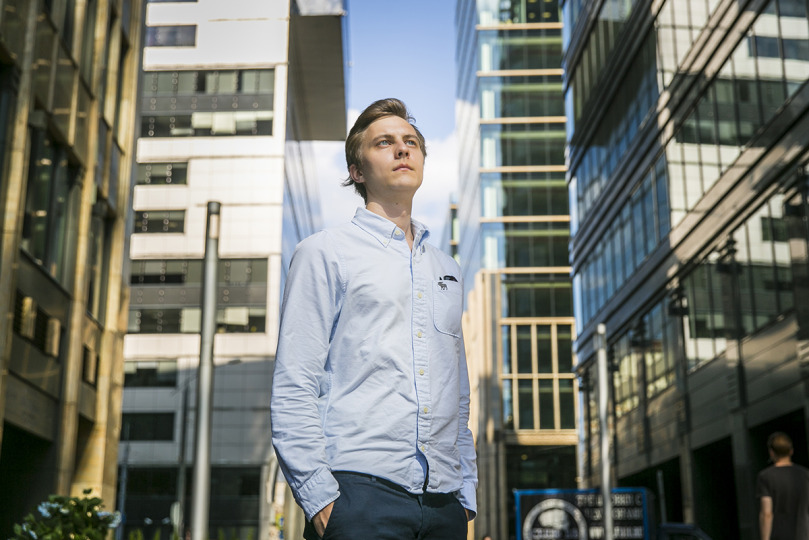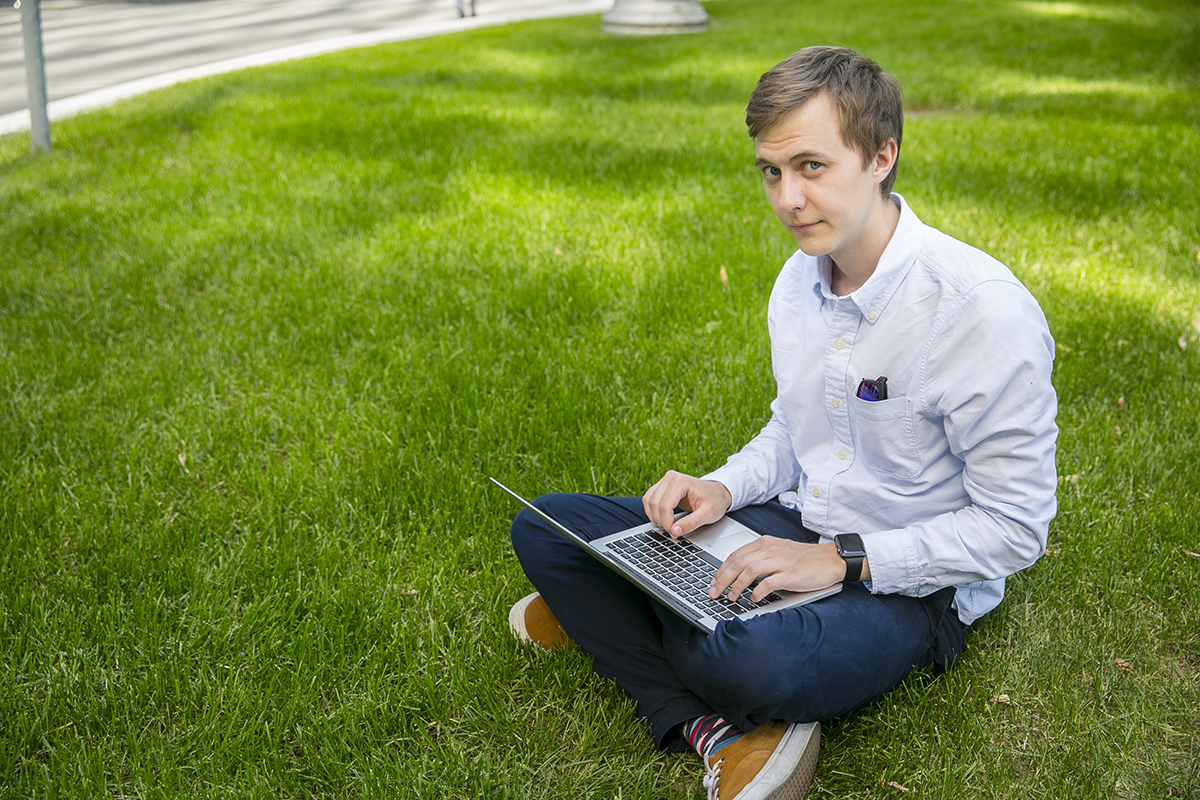Serious Projects are Born when their Creators are Still at University

HSE graduate Sergei Pronin was still studying for his degree in Software Engineering when he and others designed App in the Air, promoted by Apple as a successful mobile project. Sergei now works as the leading developer at Empatika and teaches at HSE. He talked to HSE News about trends in the app market, the unique Russian language course on developing iOS apps and about the principles of teaching in the IT sphere.
— How did you get into HSE?
— I was born and grew up in the Krasnoyarsk Region, in Minusinsk which has a population of about 60,000. In my last years at school I moved to Krasnoyarsk to go on the HSE pre-university entrance programme there. I already knew that I wanted to go to HSE and I got a place through doing well in academic competitions (olympiads). The course I took at the Software Engineering Department is now taught at the Faculty of Computer Sciences. After graduation I went on to do a Masters in System and Software Engineering.
— How did your career as an app developer begin?
— It all began when I met Bayram Annakov in my third year. He founded Empatika - which was then a young consulting company. We started working on developing mobile products. One of our most successful is now an independent company for air passengers, App in the Air which offers flight information and travel support.
Another startup we launched this year called RuBeacon is developing mobile apps for pre-ordering in restaurants and cafes. If you download the Double B coffee app you can order a drink on your way to work or at lunch and pick it up at your nearest coffee bar and skip the queue. This was a project designed by HSE graduate Mikhail Brushtein (server and web) and Alexander Balaban (iOS) and third-year students who only just came into the company, Dima Permyakov, Seriozha Smetanin, Nikita Remnyev and Vanya Oshchepkov.
Last year we were in an ad for Apple on several American TV channels and App in the Air was used as an example of a successful mobile project at the new Apple OS8 presentation. We are the only Russian team to have been spotted like this.

They’re good guys, I taught them an elective course and then invited them to do work experience with us. Now they are fully part of the team. I think it’s an ideal model for worker and employer, at least in our business - the guys know me, and if they like what I do they come on practical training with us, we give them a job to do and if they manage it and want to stay on to work then more often than not, they do.
At the moment, most of the staff at Empatika are HSE Software Engineering graduates. I specialise in developing things for Apple, Philipp Rukin, my friend from college does the servers and web applications, Dima Gridnev who has just finished the first year of his Masters is in charge of Windows and third-year Vova Kovtunovski helps him. Timur Akmetgareyev is about to graduate, he works on Android. The mobile apps business is very young and the people who work in it are young engineers. A lot of really good projects are born when their inventors are still at university.
— Is the Mobile apps business lucrative?
— Yes, because the market for them is one of the most promising and fast growing. A lot depends of course on whether you have really understood your consumers and found investors. For example, we were lucky with App in the Air. Investors came to us pretty quickly and it was clear from early on that most of our users were frequent flyers from the USA, Britain and Norway. You’ll see our app at the front of the Apple Stores in those countries. Last year we were in an ad for Apple on several American TV channels and App in the Air was used as an example of a successful mobile project at the new Apple OS8 presentation. We are the only Russian team to have been spotted like this. The important thing is not to stop. Our motto is, ‘Let’s Carry on Working!’
— How do you think the mobile apps market will develop?
— Everything’s changing really fast. When I wrote my first application for iOS, the Iphone was only about two years old. Since then the world of smartphones has changed enormously. There is a noticeable trend towards various wearable gadgets - Google glasses, Apple’s smartwatch and other multifunctional devices to monitor your body and diagnose your condition throughout the day. The other trend is for smart cars, Tesla is working on developments, Google will soon launch the first self-drive cars in California which don’t need a driver. You just get in, press a button and the car will analyse the situation on the road and decide what to do by itself, you don’t even have to look at the road.
The overall trend is to fasten brains to everything
Everything around us is becoming smart. Although it’s true that to make your house smart costs a huge amount of money (solar batteries, automated light and temperature control, smart household appliances), but it’s only a matter of time before you’ll be able to buy a system to makes your home smart in any shop.
Drones are another example. Just a couple of years ago, nobody had even heard of them and now Amazon is planning to use them in the USA to deliver parcels to their customers. We bought a drone and we’re programming it to find out whether there are any parking spaces near the office. I think the overall trend is to fasten brains to everything.
— How did your teaching career start?
— When I was a first year, Nikolay Lipkin, who was a second year, came over and offered to be our programming tutor. He needed the experience and we needed the knowledge. We took the keys, went to a lecture hall and the class began. When I was a second year he asked me to teach with him. By the third year we had the organisational support of the Business Informatics Faculty (now the School of Business Informatics) and official status of student-taught courses. They even started to pay us a small sum. I taught all the time I was studying, the topic of mobiles started in my third year and until then it was just regular programming.

— What are your plans for teaching at HSE?
— At the moment I’m running a course on iOS apps with my colleague Pavel Manakhov. Pavel talks about design and I talk about developing. It’s an elective course so there are a limited number of places. It’s possible that next year we’ll manage to make it compulsory for all third years. Vadim Drobinin and Alexander Zimin - who were on our course this year were among the winners in the WWDC Scholarship Competition and went to the Apple Worldwide Developers Conference in June.
To teach in IT today you have to be an active practitioner
We have made a Developing iOS apps online course which you can take on iTunes U, and I hope it will soon be available on Coursera. It’s the only course like it in Russian.
We are running a Summer School on Mobile Apps from 1 - 11 July at the Computer Sciences Faculty. Besides the basics of mobile programming on iOS and Android which students probably know something about, we’ll be teaching them how to master certain tokens and get to grips with the finer points.
This year, under Sergei Avdoshin’s guidance, the Masters programme System and Software Engineering is launching a specialisation in Designing and Developing Mobile Applications which will study all currently existing mobile platforms. I’ll teach about iOS. We’ll look at developing apps from ideas for mobile products to how to promote and manage growth, how to work with users, data analysis and a lot more besides. We’ll invite experts from Russian and international markets: we have specialists from IBM, Apple, Microsoft and Samsung among our teaching staff. My colleagues from Empatika will join the projects and there’ll be Pavel Manakhov’s super cool course on mobile app design too.
— What would you say is your golden rule for teaching?
— To teach in IT today you have to be an active practitioner. You have to follow avidly the development of platforms, appearance of new languages which correspond to how material is updated. An exclusive theoretical approach won’t do here. Good classes are like master classes where students work on projects with their teachers throughout the year.
Ludmilla Mezentseva HSE News

